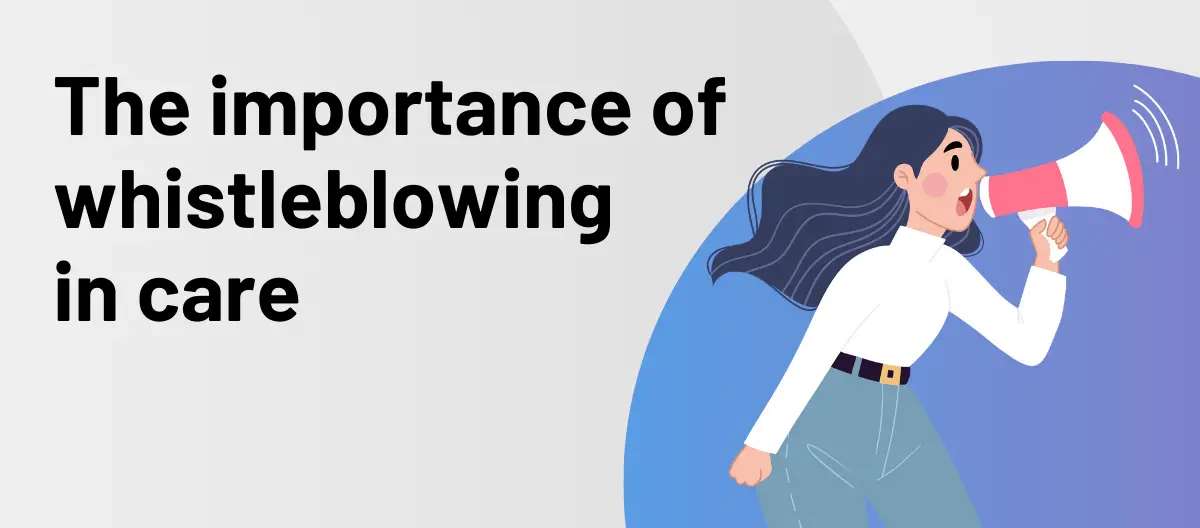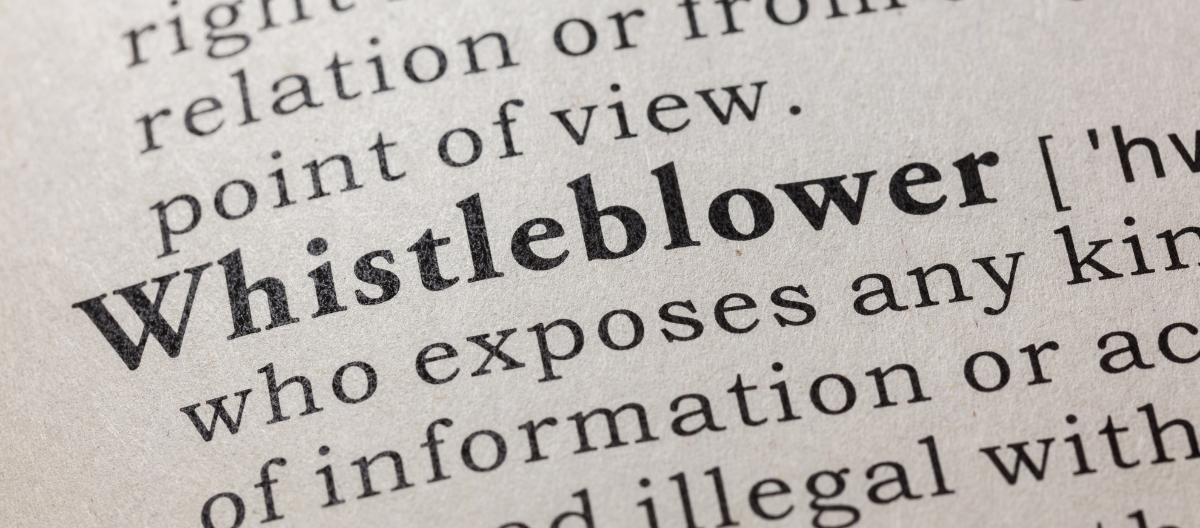Whistleblowing in care is a crucial process that brings wrongdoing to light. It’s where a worker speaks up about issues within an organisation.
Sometimes it can be an uncomfortable topic for health and care staff, especially management, to think about. However, making sure that you create an environment where people can speak up is an important part of leadership in social care.
In this article, we’ll explain more about what whistleblowing in health and social care is, who can be a whistleblower, the importance and process of whistleblowing in care, and talk about some high-profile whistleblowing cases.

Table of Contents
What is the definition of whistleblowing in health and social care?
Whistleblowing in health and social care is the term used to describe a worker speaking up about risk, harm, malpractice, or something illegal.
This could be something that puts a variety of people at risk, including service users, colleagues, or the wider community.
Whistleblowing doesn’t have to involve harm to a vulnerable person – for example, it could involve risk or harm to colleagues, a cover-up of an incident, or some kind of administrative malpractice.
Whistleblowing in care may involve an employee reporting an issue to their employer, or going to a regulatory body, such as the CQC, or the police or media.
Not all reports of risk or harm are whistleblowing. Whistleblowing in health and social care must be done by someone working with the organisation, and the issue being raised must be something in the public interest.

Whistleblowing in care vs incident reporting
Incident reporting in social care is where a care professional reports an accident, incident or near-miss. In most incident reporting cases, the staff team are doing the right thing, even if someone has been injured.
An incident report may trigger an investigation. If management don’t follow up on an incident report, or the organisation tries to cover up what happened, then whistleblowing might be necessary.
Whistleblowing vs making a complaint
If you aren’t working with the organisation, raising concerns is not whistleblowing. Instead, it’s simply called making a complaint.
If you’re a service user, family or friend, or member of the public, you can make a complaint about treatment or conditions.
If you feel that the organisation won’t take your complaint seriously or you’re dissatisfied with how they’ve handled it, you can take it further by contacting a regulatory body such as the CQC – or, if it’s an urgent and serious issue, the police.
Whistleblowing vs grievances
If you’re a worker, not all complaints are whistleblowing. For example, if you want to raise an issue with your employment contract, a personal issue with a colleague or manager, or something that affects only you, this is likely to be a grievance.
Sometimes the distinction between a grievance and whistleblowing in care can be tricky. For example, if you’re being bullied by a colleague or manager, this would generally be a grievance. However, if lots of employees are being bullied, it’s being instigated by senior members of staff, or it’s affecting the care you provide, this could be a whistleblowing incident.
Your line manager or HR department may be able to solve grievances quickly for you. The solution might be as simple as using care roster software to ensure you aren’t on the same shifts as a particular colleague.
Whistleblowing in care: who can do it?
Whistleblowers in care usually work with or for the organisation.
However, you don’t have to be an employee of the organisation to be a whistleblower. Instead, you could be an agency worker or a trainee.
You don’t have to be a member of the care team. You could be an activity support worker, chef, cleaner, or any other role. If you’ve seen something that puts others at risk of harm, you can be a whistleblower.
You don’t have to be directly affected by the concern. Many whistleblowers in care raise issues that impact service users.
What can whistleblowers report?
Whistleblowers can speak up about a variety of areas of wrongdoing. Legally, whistleblowing can refer to reports of criminal offences, environmental risks or damage, miscarriages of justice, companies breaking the law, cover-ups, or times when someone’s health and safety is in danger.
In practice, whistleblowing in health and social care usually refers to reports about health and safety.
The danger may involve a service user, other workers, or a member of the public. It could be about topics such as:
- Safeguarding concerns, such as abuse or neglect of service users.
- Poor care being provided for service users, including medication errors, untrained staff, or missed or late care calls.
- Dangerous working conditions, including not having enough staff available, or staff not having the necessary equipment.
- Not making incident reports, or covering up issues that have occurred.
The importance of whistleblowing in care
Whistleblowing can save lives.
Many people who access social care services are vulnerable. They may have complex physical or mental health conditions, mobility issues, or learning disabilities. Unfortunately, this puts them at a much higher risk of abuse than the general population.
Abuse can take many forms, including:
- Physical abuse, such as assault, handling someone too roughly, over-medicating, force-feeding or withholding food, or inappropriate restraints.
- Emotional or psychological abuse, such as isolation, threats, intimidation, or coercion.
- Sexual abuse, such as any sexual activity or exposure where the person does not consent.
- Financial abuse, such as theft, fraud, misuse of benefits, pressuring someone to change their will, or preventing someone from accessing their own money.
- Organisational abuse, such as refusing visits from family and friends, not offering choice or promoting independence, failing to respond to complaints, and general poor quality care.
Whistleblowing can also be a catalyst for change. Most people who work in care mean well. However, sometimes an organisation’s culture has become harmful, and new care workers learn from the bad examples of their colleagues and supervisors.
Some positive changes that may happen as a result of whistleblowing in care include:
- A change in staffing, at any level of the organisation.
- Punishment for abusers, such as individual care workers who have hurt service users. They may be investigated by the police and charged.
- Additional training for care workers, especially if the issues occurred because of lack of knowledge. This might include sessions on moving and handling, safeguarding, or updated guidance on how to use care reporting software.
- Better organisation within the company, such as using care management software or hiring more staff to keep up with the work.
- More monitoring of issues, either from internal or external inspectors.
- In extreme cases, the service may be shut down.
Legal protections for whistleblowing in health and social care
Unfortunately, many people are afraid to speak up when they see wrongdoing in health and social care. They may have been convinced by supervisors that something that seems wrong is fine, or “how it’s always been done.”
Lots of people also fear retaliation for whistleblowing in care. Will colleagues or managers treat them differently, or could they even lose their job?
However, there are legal protections in place for whistleblowers. People who raise concerns should not experience repercussions. If they are treated unfairly or lose their job, they can take the case to an employment tribunal.
The process of whistleblowing in care
There are two ways of whistleblowing in health and social care:
- Internal whistleblowing, where you report an issue to people within your organisation.
- External whistleblowing, where you report an issue to someone outside of your organisation – this could be a regulatory body, the police, or the media.
Most people will start with internal whistleblowing.
If you work with a care organisation and need to make a report, your organisation may have a whistleblowing policy. There might be a dedicated email address or phone number that you can contact anonymously.
If you notice a problem, you could take the following steps:
- Try and raise the issue at the time. If you notice a colleague falsifying reports or putting a vulnerable person at risk, speak up straightaway.
- Talk to your supervisor or line manager. If you don’t think that they would be receptive to your concerns, try to speak to someone else senior in your organisation.
- Follow your organisation’s whistleblowing policy.
- If you don’t think that anyone will take you seriously, or you are worried about the impact of speaking up internally, raise your concerns with the CQC, other regulatory body, police or media.
You may never know the outcome of your whistleblowing concern. However, if the issue persists and no one has taken action, you can escalate your concerns to an external body.
Examples of whistleblowing in health and social care
There have been some high-profile examples of whistleblowing in health and social care. In each case, service users were being harmed, and whistleblowers spoke up. Click the links below to learn more about these individual cases:
Whistleblowing in health and social care
Whistleblowing in care can be an uncomfortable topic. However, it can create real change. If you’ve noticed that there are issues in your workplace, it’s important to speak up.
As a care provider, you can help your staff team in several ways:
- Foster an open, welcoming culture, where team members feel able to raise concerns.
- Use care planning software to make sure that you have enough staff to cover care visits and they aren’t too rushed.
- Ensure your staff have the necessary training to provide good support for service users.
- Talk to service users and their families about their experience of the service – and take action if there are concerns.
Do you need support with your reporting and risk assessment documentation? Get access to 100+ care and compliance templates with PASS.




